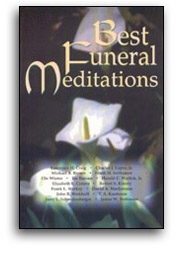SermonStudio
When A Christian Dies
Sermon
Best Funeral Meditations
Sunday sermon after a member's death in church the previous Sunday
Jerry L. Schmalenberger
Last Sunday, Mrs. Dwight (Roberta) Keller drove to her church for worship, as was her custom. She had for years helped in the nursery, took part in the church school, and faithfully worshiped as a part of our family of God.
She died while seated in the pew last Sunday during the sermon.
Jerry L. Schmalenberger
Last Sunday, Mrs. Dwight (Roberta) Keller drove to her church for worship, as was her custom. She had for years helped in the nursery, took part in the church school, and faithfully worshiped as a part of our family of God.
She died while seated in the pew last Sunday during the sermon.


